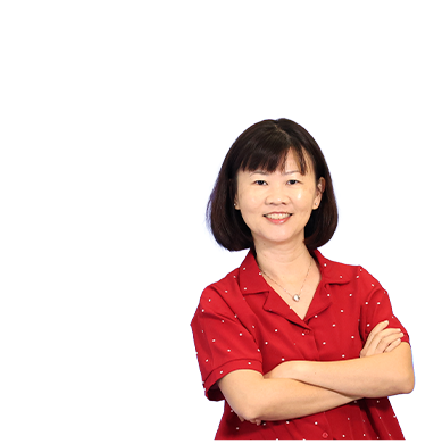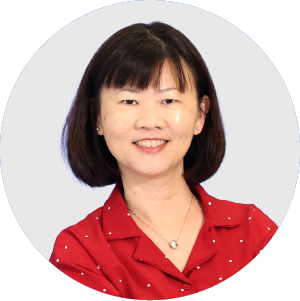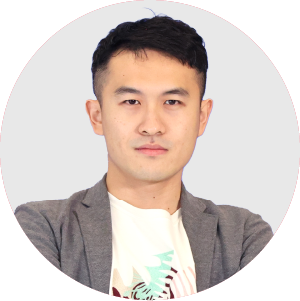教我如何说爱
跨族婚姻教会我与父母沟通
年轻一代如何“说爱”?

高程锦Koh Cheng Jin
青年作曲家

陈素君《联合早报》副刊编辑
陈宇昕《联合早报》副刊记者


陈素君《联合早报》副刊编辑

陈宇昕《联合早报》副刊记者
中
EN
Some discussions can go on forever.
Some stories cannot be told enough.
Welcome to Zaobao podcast Same Same But Different. I'm Yu Xin.
I'm Sor Koon.Same Same But Different is presented by the Singapore Chinese Cultural Centre. Let’s learn about the culture and stories of Chinese Singaporeans together.
In the podcast, we chat with Chinese Singaporeans from different backgrounds about how they view their Chinese identity.
There are many labels associated with Chinese people, for example, they are not known to communicate their love and affection openly. Chinese parents and children find it hard to express their love for each other. Sor Koon, you have children in your family. Is it difficult for you to talk about love?
As my children grow up, we say and hear the word “love” less. Yu Xin, you are an adult now, when was the last time you told your mother that you love her?
I have never said it since I was born. It's awkward in my family to even watch romance dramas together. To openly express our love for each other is unthinkable.
We see that Yu Xin’s family is more subtle in their expression of love. What about the Chinese families today? Is it still difficult for them to talk about love? Let’s listen to what our guest today has to say.
Our guest today is Koh Cheng Jin, a young composer who is studying for her doctoral degree in New York University. Our time difference is 12 hours. We appreciate that she is helping us to record this programme after her grocery shopping and before going to bed.
Hi everyone, happy to chat with you.
Interracial relationship and marriage
When we chat with Cheng Jin, it is unavoidable that we have to talk about her recent wedding. She just got married. Heard that she held wedding ceremonies in Singapore, Malaysia and the US. Her husband is Tengku Irfan, a famous Malaysian musician.
How did both of you meet each other?
About 6 or 7 years ago. We met at the Juilliard School in Manhattan, New York.
You were classmates?
Not exactly. He is 2 years younger than me. He was my junior. I was in Year 2 while he was in his first year at the university. It began with casual conversations in the music room. Then we attended concerts together. We were friends for a year before going into a relationship.
How long were you dating before getting married?
Almost 6 years. This is our 6th year together. I don’t consider it long. I know of others who were dating for more than 7 years.
In the context of “modern love”, 6 years is considered a long time.
When did you tell your parents about it?
After about a year. I checked my Whatsapp history this morning. Almost a year later.
What was their reaction?
In the beginning, they were worried. I was still young, about 20 or 21 years old, and living alone in the US, far away from home. They have not met him. They know that he’s Malay and does not speak Mandarin. There are differences in terms of diet and culture. Hence, they were worried, and wondered if I had found the right person? They would ask me repeatedly if I am certain and if there are other choices? I do have many other choices, but he was the one. Fortunately, as time passed, my parents became closer to Irfan and more accepting of our relationship.
Were your parents surprised or resistant at first?
Initially, they were surprised and slightly resistant. Being parents, they meant well and they wanted to know if I was serious about the relationship. I was very serious, and we were dating with marriage in mind. I was 21 years old and knew that I wanted to find someone who’s right for me. I did not want to have many relationships, which would be exhausting. My parents saw my determination. They slowly understood me and respected my decision.
I am curious. At 21, people can still be rebellious. When their parents respond negatively, they may shut out their parents and make their own decisions. Did you feel the same way? Or did you try a softer approach? How did you win your parents over?
Of course, I felt disappointed initially. I rarely share my life with you and when I did, why were you resistant? However, I understand where they are coming from. I followed up with text messages to them. We usually communicate via Whatsapp. I would be afraid to speak up or feel awkward if I tell them face-to-face or hear their voices over the phone.
I am not good at opening my heart to my parents. I prefer to send text messages to them. WhatsApp messages are faster. From time to time, I would tell them that Irfan is taking care of me well. I will share the food he brought for me, and the stuff we did together. Even though my parents did not ask, I would continue to send text messages to reassure them. They have gotten used to it, and I think it helps them to know Irfan better, and slowly accept him.
Your parents have recognised his love for you. I believe they are touched by it.
Yes, it is a blessing that they have accepted him.
How do you express love?
Have you seen how his Malay family members express their love and affection? How is it different from Chinese families?
Yes, my husband’s family is very harmonious. They would sit down and confide their emotions to each other. This is something that my family finds it hard to do.
I guess that they can be so open to each other because they pray together. They would pray quietly or directly for each other. It helps to bring them closer together. This does not happen in my family.
Recently, I was invited to a wedding ceremony in Malaysia. I learnt to do salam, which is a form of greeting in Malay tradition. You put the person’s hand on your forehead while bowing down. It is a simple gesture and may not mean much. However, as someone from another ethnic group, it makes me feel closer to them.
Cheng Jin, you mentioned that you informed your parents about your relationship through Whatsapp. Is your family a more traditional kind of Chinese family where personal feelings and expressions of love are shared via texts?
Yes, my parents and I are not used to expressing our emotions through body language or greeting gestures. We tend to express them through our actions. For example, when the other person needs help, we will get it done without asking. If we are too direct, I will feel awkward. I am more comfortable with Whatsapp.
So you don’t tell your parents “I love you”?
No, I have never done that.
I’m rather surprised because I thought that it is only people of my generation who tend not to express their love and affection towards their parents. Cheng Jin is relatively young, but you are also not brought up to express your love by hugging and holding hands with your parents.
Yes, I am different from my friends of the same age. They are more open. They like hugs, a pat on the head, and more intimate interactions. Personally, I have not done all those things since I was young. Maybe as a kid, yes, but I have forgotten that feeling. After puberty, it has become very awkward.
After talking to your parents about your relationship, has your family relationship changed too? Do you feel more at ease with your parents about your feelings?
Things have certainly gotten better. He was my first boyfriend, and it was difficult to talk about it. After I spoke to my parents about it, I feel that it is much easier to share my challenges and setbacks in life. Compared to the past, It has become more natural to tell them about such stuff.
Getting married into a Malay Family
After marriage, how is it like to be married to someone from another ethinic group and religion? How did you adapt psychologically? Is there a huge difference in culture and customs? Did you find it easy to fit in? How did you prepare for it?
Yes.After all, I was raised in a traditional Chinese family. My parents have always hoped that I would marry someone who is Chinese and speaks Mandarin. Although they have been living in Singapore for a long time, they are still very traditional in their thinking.
They have influenced me too. Before I met my husband, I imagined that my children would speak Mandarin and would speak the language better than me. And they will know more about China's history than me. I wish my children will learn Chinese literature because I did not have the opportunities to learn all these things.
When we were dating, I thought hard about what to do. We don’t know which country we will be living in? What language will my children be learning? When I got married into a Malay family, I had to first overcome my preconceptions as a Chinese.
I have to get rid of preconceived mindsets and learn to accept a new culture, faith and lifestyle. It is a different race, religion, culture and language.
Initially, it was difficult and I faced psychological struggles. Gradually, I learnt more about my boyfriend and his character. When I finally decided on him, I realised that I can take my time to learn and I am hopeful. As long as he treats me well and we care for each other, other considerations can be dealt with later.
Most importantly, marriage is about the two of you, right?
That’s right.
That is the power of love.
New chapter for newlyweds
Just now we talked about how Cheng Jin learned to salam (a salutation meaning “peace” used especially in Muslim countries) in Malaysia. Cheng Jin, do you need to learn the Malay language and Quran too? I’m sure you need an orientation. Do you need to learn them intentionally?
I converted to Islam one year after my marriage. One year before the conversion, I attended religious classes in Singapore. We attended lessons an association in Singapore called Darul Arqam (Muslim Converts’ Association of Singapore) where we get to know other Muslims and teachers. They will arrange mandatory lessons for us to attend. Only after attending these lessons can we officially convert to Islam.
I learnt a great deal at Darul Arqam. The teachings made me realise that many Chinese Singaporeans and overseas Chinese know very little about Islam. They do not have a deep understanding of the religion.After these lessons, I learnt more about the religion, and its positive influence on my husband as well as how it has influenced his upbringing and mannerism.It is not necessary to learn Malay. I asked my boyfriend if I needed to learn Malay. He told me that it’s not necessary because his family is used to speaking English. So I did not feel pressured to learn a new language.
Do you have any specific examples? What are the stereotypes that you used to have and were they broken?
Yes. As Chinese, we tend to think that Muslims have to wrap themselves up. In Singapore, we have seen young and old people who are very particular about how they dress. At first I had similar preconceptions, and wondered if I had to wear a hijab. My husband said that it’s not necessary. I used to worry about such changes if I joined their family and asked them many times. They were very nice to me and reassured me that I do not have to practise it. They will not force me to do it unless I want to. Fortunately, they made it very clear to me right from the beginning. As a result, I did not feel pressured and could happily do the things I like. Focus on building my relationship with Irfan, and acquire deeper learnngs abot Islam.
At a spiritual level.
Yes, to understand it deeper, not just about what I wear, the superficial aspect of it. Personally, I do not like to wear trendy and shiny clothes. I am very conservative, so I did not have to make a huge sacrifice in terms of how I dress. However, I know many Chinese value freedom in fashion. They are young and it is understandable, but I don’t have strong opinions about it.
We often judge things by their cover. Like you, when you go deeper into the religion, you get to the spiritual level of it. Chinese in Singapore and Malaysia need to be aware of micro aggression. We might accidentally discriminate against others by making comments without thinking about the context and reasons behind their actions. It is only through deep understanding can we have different perspectives of things.
I had a hard time giving up the consumption of pork. I knew there was a reason behind it, and there may be deeper considerations that I have not explored. I found it hard to change my diet. I could not eat dumplings. My family likes to eat pork, so they got worried when they noticed that I had to abstain from pork.
Cheng Jin, you mentioned that you had to attend religious classes to understand the Malay culture and its practices. What about your husband? How did he adapt to become a member of your Chinese family?
He attended an exchange programme at Columbia University, where he studied Mandarin for three months. It was quite challenging for him because I feel that Mandarin is one of the most difficult languages in the world. You need to learn to pronounce and understand the Chinese characters which have many strokes. He found the process of learning Mandarin to be extremely difficult, but he was happy and enjoyed it. He improved a lot. They taught traditional Chinese characters; it was thus challenging for both of us. From time to time, I also teach him simplified Mandarin. Currently, he is learning Mandarin with me daily.
Do both of you speak Mandarin occasionally?
Yes, sometimes.
When he comes to Singapore, he can show off his Mandarin to your mother.
Different perspective on your cultural identity?
The younger generation is influenced by different cultures. Cheng Jin came from a traditional Chinese family, furthered her studies in the US, and married into a Malay family. Do you have a new understanding of your cultural identity?
I feel more like a global citizen, not just a Chinese, a Chinese Singaporean, an ethnic Chinese, a Chinese who performs folk music or a Chinese composer. Whether it’s in the US or Singapore, I am often introduced as a Singapore young female Chinese composer. But I feel that I have gone beyond these limits. I have become more internationalised. Because of interactions with my husband, I have learnt a new culture and religion. Through the comprehensive process, I feel that my life has been enriched. I have become more adaptable and found greater meaning in life. I am no longer my old self who was conservative and close-minded, with a single personality. I have learnt how to learn, to accept and to draw from the essence of different religions, cultures and languages. I have grown a lot and benefited from it.
From Cheng Jin’s love story and her experiences, we can see that identity can be fluid. We often think of it as being rigid, having only one possibility or one way. Humans should be more like a sponge, absorbing all cultures and integrating them internally.We thank Cheng Jin for participating in our programme today. Both of us have learnt a lot from her. We believe that our audiences have found it rewarding too.
We have gained new insights. Thank you Cheng Jin.
Thank you for having me.
I am Tan Sor Koon.
I am Tan Yu Xin. Thank you for tuning in to our podcast!
Same Same But Different podcast is presented by the Singapore Chinese Cultural Centre.Producers:Bian He, Ong Wen Yi and Lee Yi QianPost-production:Hoe Jian WeiZaobao podcasts are available on zaobao.sg and major podcast players. If you like our podcasts, please share and subscribe to them.
一些话题讲不完。
一些心声听不够。
欢迎收听早报播客《三言两语》。我是宇昕。
我是素君。《三言两语》由新加坡华族文化中心呈献。与我们一同了解新加坡华人的文化和故事。
我们在节目里,与来自不同背景的新加坡华人聊聊他们如何看待自己的华人身份?
华人身上总有一些标签,比如说不懂得表达爱,像父母亲很少会跟孩子说爸爸妈妈很爱他,然后孩子也很难开口表达他们对父母的爱。像素君,你自己也是有家庭有孩子。对你来说,讲爱这件事情是一个很困难的话题吗?
我觉得随着孩子慢慢长大,其实说出爱的这个字,然后听到他们回应爱这个字的频率,其实是越来越低了。像宇昕呀,你现在已经是大人了,所以你最后一次跟妈妈说“你爱她”是什么时候?
好像打从娘胎都没有说过这种话。对,我们家蛮尴尬的,就是连在一起看那种爱情片,大概都是不可能的事情。
那么像宇昕的家庭,可能就是,表达爱的方式是比较含蓄。就不晓得现在的华人家庭里面,是不是爱是那么难说出口的呢?我们来听听我们今天嘉宾的经历。
今天我们邀请到的嘉宾是高程锦。她是本地优秀的青年作曲家,目前人在纽约大学攻读博士。那现在我们跟她有12小时的时差。然后很高兴,很感谢她,就是在买完菜,准备睡觉之前来跟我们做这个节目。
你们好大家好,很开心能够跟你们一起聊天。
异族爱情与婚姻
在跟程锦聊的时候就难不免就会谈到最近她的喜事,因为她最近刚结婚了。然后听说她在新加坡跟马来西亚,在美国也都有办婚礼,然后做了一些仪式哦。她的丈夫Tengku Irfan(东姑阿末依方)也是马来西亚非常著名的音乐家。
可以说一下你们是怎么认识的吗?
大概是6、7年前,我们是在纽约,那个曼哈顿茱莉亚音乐学院认识的。
哦,所以是同学?
其实不算同学,因为他比我小两岁。然后,他就是等于比我小一届,所以我那时候是大二,然后他是大一。所以我们开始在琴房那里聊天。然后一起去看演奏会,然后是做了一年的朋友,才开始交往。
你们交往多久然后结婚?
大概快6年。今年是我们在一起的第6年。 其实也不算长,就是我知道有些人是可能7年以上。
现代的爱情,交往的那个6年算是蛮长的。
你是在,就是交往的哪个阶段跟父母亲介绍这位朋友的呢?
是交往后的一年,快一年。我刚刚今天早上还回去看那个Whatsapp记录,快一年后。
他们有什么反应?
刚开始的时候他们会比较担心,因为毕竟我那时候年纪还不算大,20、21岁这样子,然后又在遥远的美国。他们也没有见过他,他们也知道他是马来人,也不说中文。饮食方面,文化方面会有一些差异,所以他们就担心,你确定你找对的人吗?会跟我反复地确认,就是你确定,没有其他的选择吗?我就想,其实是有很多选择,但是我就是想要选他就是了。所以还好,经过时间,我们慢慢的拉近他跟我父母的距离,所以久而久之就慢慢接受,然后包容。
那父母一开始是只是惊讶吗?还是其实他是有小小的抗拒的一个感觉?
刚开始他们是又惊讶又有一点小抗拒,因为当时他们就出于父母心,他们就是想要知道我是很认真的。其实我是非常认真 ,我们是以结婚为前提交往的。我那时候就21岁,我就知道如果要找的话一定要找一个就好了,我就不要一直在尝试,这样子我会觉得很疲惫。然后他们就是看到我这样的态度,所以他们也被影响到, 他们就慢慢地体谅我,也尊重我的决定。
我好奇哦,就是21岁应该还蛮叛逆的。不知道有些人可能一听到父母亲这样的反应,我就想从此以后不要跟父母亲讲了,我就自己做自己决定。你是这样子的方式吗?还是你是用一个比较柔软的方式,然后有计划怎么去说服父母的一个方法让他们认可?
刚开始当然是有点小失望啦,就是为什么我难得跟你们分享,然后你们就还是会有一点抗拒。但是我过后就觉得我能理解他们为什么会这么想,所以我会发一些简讯过去。因为我跟他们讲的时候是通过WhatsApp简讯的,因为,我觉得如果当面讲的话,或者是打电话听到他们的声音的话,我会不敢讲,然后会很不好意思。
然后我又不是很擅长跟他们敞开心扉的那种人,所以我会比较喜欢用简讯表达,就跟父母啦。所以当时候因为WhatsApp会比较快一点,所以我会时不时跟他们发一些(有关)Irfan他对我的好(的简讯)?所以我会跟他讲,今天他带这个东西给我吃,然后今天我们去做了什么。所以他们虽然没有问, 但是我会自己发过去,就是说他会怎么怎么对我这样子。所以可能他们也习惯了 ,他们也看清楚他的人格,也慢慢就赞同了。
算是,爸爸妈妈也认同这个男朋友对你的那种爱。我相信他们也是被感动的。
对对,还好他们是比较能接受的。
表达爱的方式不一样
你有观察到就是马来族,他们家庭成员之间那种表达爱、表达亲密的方式跟华人有很大的不同吗?
有的,我能观察到我先生的家庭,他们是非常融洽的,就是融洽到可以坐下来面对面,把私密的一些情感这样互相倾诉的那种。这个是我在我家庭里难以做到的。
我觉得他们能这么坦诚地相待,是因为他们还会一起祷告。还有他们也会为对方祈祷,不管是默默的,或者是我直接这样为你祈祷,这样肯定会拉近一些距离的。这是我家庭里也没有的。
我最近回去马来西亚举办婚礼。我就真的有观察到这一幕,也有参与其中。同时,我也有学会怎么salam(额手礼),就是他们马来人传统的问候方式,就是拿双手,然后握着对方的手,然后把手放在自己的额头上,然后自己这样弯腰。虽然这样的举动很简单,也不代表那个人关心你还是怎样,但是我觉得这样就能瞬间让我身为一个不同种族的人,跟他们的关系亲近不少。
刚才因为程锦你提到说,因为你跟父母宣布这个消息的时候,就是你在交往的对象的时候,你是通过Whatsapp的方式。所以是不是,你们家庭就是一个很传统的华人家庭,是比较不会把这些比较私密的话,或者是那种对爱的表达都是用文字来传达的呢?
对对,因为我和我父母最习惯的表达方式其实不是通过肢体语言,或者是热情的问候。其实我们最习惯的表达方式就是实际行动啦,就是我们会做一些小行动,比如我们不会讲我帮你做这件事情,就是你来的时候已经做好了。所以我太直接的话,我会很尴尬,WhatsApp我会觉得比较舒适一些。
所以不是那种会跟爸爸妈妈说我爱你这样子的。
不会不会,从来都没有。
这我倒是挺意外的,因为我以为是我这个年纪的人比较不会跟爸爸妈妈表达爱。所以程锦相对年轻,可是你的这个成长环境也不是那种用拥抱,或者是牵着爸爸妈妈的手来表达爱的。
对,其实我跟我的很多同龄朋友不一样。因为他们那种表达方式是比较大大咧咧,他们会拥抱,会摸头, 会那种比较亲密的接触。但是我个人就是从小都没有,可能小时候,小孩的时候会有,但是已经忘了这样的感觉。所以到了那个青春期的时候,当然就会觉得很尴尬。
那现在就是,跟父母谈和你之前就男朋友的关系,应该是有重新建立一个不一样的的家庭关系了吗?你会觉得你现在可以更敞开心房跟父母亲交谈,然后谈更多私密的事情?
我觉得肯定是有一些的改进,就是在那部分。就是跟他们讲了有男朋友的那些事情之后,因为毕竟他也是我第一个男朋友,所以难以启齿。但是通过这件事过后,我就会比较容易跟他们分享我在生活上的一些困难,一些挫折,就会比较自然地跟他们表达出来,但是之前是没有的。
嫁入马来族家庭
那真正进入就是婚姻之后,就是大家还是会有一些想象,跟另外一个族群,另外一个宗教的人结婚,是不是需要经过很多你自己心理上面的调适?然后你正式进入婚姻之后,你觉得你的调适跟文化习俗上面的差异,真的那么巨大吗?还是其实是很自然地就可以融入?你自己怎么看这个问题?你之前有做很长的心理准备吗?
有的,因为我在这么传统的华人家庭长大,父母都希望我以后相处的对象,要会讲中文,要是个华人。虽然他们在新加坡生活了很久,然后可是他们还是比较传统一点。
这也影响到我。所以还没有找到他的时候,我会有想到以后的孩子,要会讲中文,一定要比我更会说中文,要比我更懂中国历史这样子。因为我在新加坡没有什么机会学到这些,所以我就觉得我以后的小孩一定要会文学那种东西,所以我有投射我以前的一些遗憾。
当时跟他交往的时候,我会很深入的思考,就是要怎么办?因为以后又不知道我们会住在哪里,哪一个国家,然后孩子又不知道会学什么语言。所以我那时候嫁入马来族家庭的时候,我最先要克服的一些华人思维的束缚。
我会觉得我需要把不经意的 mindset(思维)消除掉。我那时候也要学着接受,还有采纳一个新的文化,还有信仰,还有生活方式,因为毕竟是不同的种族,也不同的宗教,不同的文化跟语言。
所以我觉得起初会比较难,有一些心理挣扎,慢慢地认识男朋友,还有认清楚他的人格,还有锁定他以后,我就觉得,慢慢应该是可以的,应该有希望。只要是他对我好,我们互相对对方好,其他的一些考量就可以待会儿再说。
最重要还是两个人,对不对?因为结婚是两个人的事。
对。
感觉就是爱可以征服一切这样。
新婚生活
刚才讲到回去马来西亚的时候有学他们怎么salam(额手礼),然后你有需要去学马来语吗?还有去认识可兰经?需要一个orientation(训练)这样子。你自己是怎样,需要刻意去学习吗?
那时候我是在结婚的一年,然后接受伊斯兰教的。然后,我在f接受 (伊斯兰教) 的前一年,我有在新加坡上了一些课,就是你说的那些宗教的课。因为新加坡有一个清真寺或者是一个学坊,叫作 Darul Arqam(回教福利组织),然后在那里,我们想要认识伊斯兰教的一些人,我们都会去那里上课,交朋友,找老师,学习这样子。他们会有安排好一些我们需要上的课,上完了这些课以后我们才可以,就是 officially(正式地)去接受这个宗教。
我觉得我学到很多东西,他们教的一些知识也是我从来没有认识到的,因为我发觉很多新加坡华人,或者是海外华人,他们对伊斯兰教的认识是很薄的,没有一个很深层的一个认识。我发觉上过这些课之后,我会慢慢的去了解。然后认识这个宗教的好,然后我也发觉到那个宗教对我先生的一个好的影响,就是他的成长,他的为人处事方面。至于马来文呢,是没有这个必要,好像是。因为我有问我的男朋友,我需不需要读马来文?然后他跟我讲,其实没有必要,因为他们的家庭是比较习惯讲英语的。所以我就没有觉得有那个压力,要去学一个崭新的语言。
你有没有一些比较具体的例子,是怎样的刻板印象?你自己以前也曾经这样子认为的,然后现在终于打破了的?
有的,比如最明显的就是华人都觉得信仰伊斯兰教的人,一定要包头到脚,就是全部包到完啦。然后在新加坡我们也看到很多这样的例子,不只是年轻人,就是老一辈了,他们都比较讲究。所以刚开始我也是认为,这样子我要不要去包头,然后他也说我不用了。然后我就担心,如果我真正的加入他们的家庭之后,我需不需要做这样的一个改变?然后我有去问了他们很多遍了,他们都对我很好,因为你没有这个习惯,我们也不需要你因为这个宗教而去包头。如果你是真的想要去包的话,你才去包头,我们不会逼你。所以还好他们一开始就这样跟我讲得很清楚,所以我也没有那方面的压力,所以我就很开心的去做我喜欢的事情,然后跟Irfan培养感情这样子。就是专注在伊斯兰教比较非表面的那些。
精神层面的。
对对对,更深入的去了解,不是那种表面的穿着方面。而且,我本身本来穿着方面就是比较简单,我也不喜欢那种Bling Bling(闪闪发亮的衣服)啊,我也是非常那个保守的。所以其实这方面也没有做出太大的那种牺牲了。但是很多华人,他们现在都是比较注重自由,那个Fashion(时尚)、自由 and all that(这些方面)。 所以年轻人,所以难免,但是我没有那样的一个执着。
其实有些时候外在的东西,我们太容易看到表象了,其实像您真正去深入去了解那个宗教的话,其实更多的时候是精神层面的东西。我也不知道就是,新马华人经常就是,我觉得所谓的micro aggressive(微歧视),就是我们经常会不小心在生活中不小心就讲的这些东西,然后没有去想它其实背后有什么理由,或者是真正了解之后,可能我们就会有一个不同的一个观感。
其实我刚开始是对于不吃猪肉是比较难释怀的。但是我知道是有原因的,而且他们可能有更深入的一些方面,我还没有去探讨。所以我那时候是觉得比较难适应,而且有很多饺子都不能吃了,然后我的家人也喜欢吃猪肉,所以可能他们看到我要克制我自己吃猪肉,他们就立刻就会开始担心起来。
刚才程锦说,因为你有特别去上一些宗教课来了解马来族的文化,还有一些习俗的。那你的先生,他的那方面怎么调适,就是成为这个华族家庭的一个成员?
他有为了我们,去哥伦比亚大学那里的一个交换的一个programme( 课程 ),他有去学3个月的中文。所以那时候他学的还是有点辛苦,因为中文是世界上其中一个最难的语言,就是你不止需要读得懂,也要看得懂,然后太多笔画了。所以他那时候就觉得非常辛苦,但是他很开心,他也乐在其中,他也进步了不少。但就是因为他们教的是繁体字,所以这对我跟他,都是比较有高难度的。我也时不时会去教他一些普通的中文,所以他现在有,每天都有跟我学习中文这样子。
所以你们平常也会偶尔讲一下中文?
啊,偶尔,会的会的。
等他到时候有机会来到新加坡,就可以在你的母亲面前表现一下。
重新认识自己的文化身份?
现在很多年轻人都受到很多不同文化影响。那么像程锦这样子是来自一个传统的华人家庭,然后之后到美国留学,后来又跟马来族的同胞结婚,加入了马来族的家庭。那你对自己的文化身份的那种思考,是不是有了新的理解呢?
我觉得我自己更多像是一个世界的公民。不只是单单的华人,新加坡华人,华族华人而已,玩民乐的华人,然后写曲的华人,因为他们每次介绍我们,都是讲一个新加坡青年女性,然后华族作曲家, 他们可能会这么介绍,(无论)在美国,(还是)在新加坡。但是我现在就是认为我突破了这些范围了。我觉得我是比较国际化了。因为通过与我先生交往,然后学习新的文化跟宗教,这样的一个综合性的一个过程中,我自己觉得我的生活真的充实了很多。然后同时我自己的应变能力也提升了很多。我也觉得我现在生活更有意义,因为我觉得我也不再是之前的那个我,之前的那个比较保守,然后或者是比较放不开,然后比较单一的一个性格。我现在是比较学会了怎么去学习,然后接纳,然后去吸取那些,每一个宗教,或者是每个文化,每个语言的精髓。所以我觉得我自己真的成长了很多,我觉得我受益匪浅。
嗯,那从程锦的爱情故事,她的成长经验,其实我们可以看到就是身份这个东西,它应该是很柔软的。我们经常会误会,要把它变成一个非常僵硬的东西,好像只可以这样子,只有一条路。但其实人应该都像海绵一样,应该把所有的文化,所有的看到的一切都融入在自己的身体里面。那我们今天非常感谢程锦参加我们的节目,然后让我们两位主持人也学习很多,相信听众也会有所得。
有新的一些领悟,谢谢程锦。
谢谢。谢谢你们邀请。
我是陈素君。
我是陈宇昕。谢谢收听!
《三言两语》由新加坡华族文化中心呈献。编导:卞和、王雯镱、李宜倩后期制作:何犍玮早报播客可以在zaobao.sg,以及各大播客平台收听。欢迎你点赞分享。